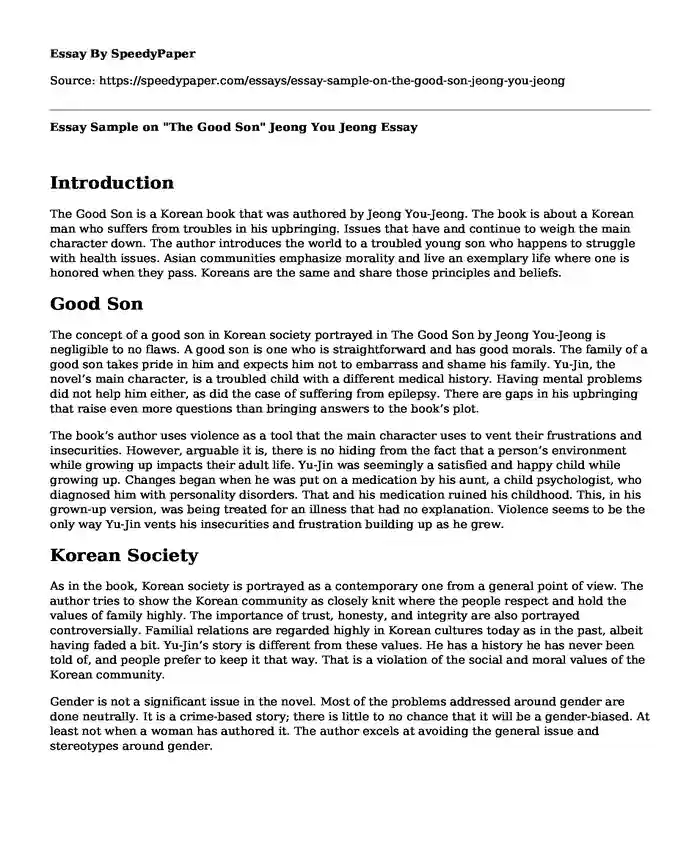
| Type of paper: | Essay |
| Categories: | Literature |
| Pages: | 3 |
| Wordcount: | 572 words |
Introduction
The Good Son is a Korean book that was authored by Jeong You-Jeong. The book is about a Korean man who suffers from troubles in his upbringing. Issues that have and continue to weigh the main character down. The author introduces the world to a troubled young son who happens to struggle with health issues. Asian communities emphasize morality and live an exemplary life where one is honored when they pass. Koreans are the same and share those principles and beliefs.
Good Son
The concept of a good son in Korean society portrayed in The Good Son by Jeong You-Jeong is negligible to no flaws. A good son is one who is straightforward and has good morals. The family of a good son takes pride in him and expects him not to embarrass and shame his family. Yu-Jin, the novel’s main character, is a troubled child with a different medical history. Having mental problems did not help him either, as did the case of suffering from epilepsy. There are gaps in his upbringing that raise even more questions than bringing answers to the book’s plot.
The book’s author uses violence as a tool that the main character uses to vent their frustrations and insecurities. However, arguable it is, there is no hiding from the fact that a person’s environment while growing up impacts their adult life. Yu-Jin was seemingly a satisfied and happy child while growing up. Changes began when he was put on a medication by his aunt, a child psychologist, who diagnosed him with personality disorders. That and his medication ruined his childhood. This, in his grown-up version, was being treated for an illness that had no explanation. Violence seems to be the only way Yu-Jin vents his insecurities and frustration building up as he grew.
Korean Society
As in the book, Korean society is portrayed as a contemporary one from a general point of view. The author tries to show the Korean community as closely knit where the people respect and hold the values of family highly. The importance of trust, honesty, and integrity are also portrayed controversially. Familial relations are regarded highly in Korean cultures today as in the past, albeit having faded a bit. Yu-Jin’s story is different from these values. He has a history he has never been told of, and people prefer to keep it that way. That is a violation of the social and moral values of the Korean community.
Gender is not a significant issue in the novel. Most of the problems addressed around gender are done neutrally. It is a crime-based story; there is little to no chance that it will be a gender-biased. At least not when a woman has authored it. The author excels at avoiding the general issue and stereotypes around gender.
Conclusion
As presented in the novel, South Korean society has very many similarities to that or the present. The book portrays it as one that aligns with the principles and values of communism, where people look after each other. Taking care of children and their well-being is the duty of everyone in society. Present-day South Korea holds on to many of the traditional values. Even so, the difference is in it. The book portrays most of the present-day part of society; there is a conservative touch to the community that is not described in the book.
Cite this page
Essay Sample on "The Good Son" Jeong You Jeong. (2024, Jan 01). Retrieved from https://speedypaper.com/essays/essay-sample-on-the-good-son-jeong-you-jeong
Request Removal
If you are the original author of this essay and no longer wish to have it published on the SpeedyPaper website, please click below to request its removal:
- Free Essay Sample on Protective Role of Blood Groups
- Tao Yuanming - Free Essay Sample in World Literature
- Free Essay Dedicted to David Hockney and His Connection to Modernism Movement
- Free Essay Comprising a Discussion of Eliot's Wasteland
- Learning Goals. Essay Example
- Free Essay. Comparison Between the Approaches of the Photorealists to That of Pop Artists
- Paper Example: Analysis of 'The Metamorphosis'
Popular categories




